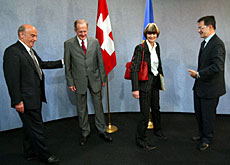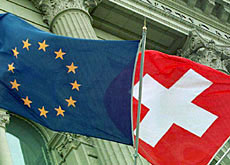Deiss confident of winning support for bilaterals

The Swiss president, Joseph Deiss, says he is confident of winning public support for a second set of bilateral accords with the European Union.
He told swissinfo he was not worried about the threat of a referendum against the treaties, which are expected to be put before parliament in the autumn.
Last month Switzerland wrapped up more than two years of negotiations on a package of nine accords after Brussels agreed to guarantee Swiss banking secrecy in exchange for Bern’s cooperation in taxing EU residents’ savings.
The agreements include closer cooperation on security and asylum and the fight against international smuggling and customs fraud.
But domestic opposition to the treaties is threatening to delay their ratification. The rightwing Swiss People’s Party has already announced its intention to hold a referendum on the Schengen agreement governing cross-border crime.
Deiss became the Swiss economics minister in 2003 following a three-year stint in charge of the foreign ministry. He currently holds the largely ceremonial post of Swiss president.
swissinfo: How concerned are you about the threat of a referendum on the bilateral accords?
Joseph Deiss: I would not call the referendum a threat, since it is an element of our political system. I am convinced that we have the right arguments to convince our citizens that they should accept these new treaties with the EU.
For the moment, these accords are the best way to improve our relations with Brussels and offer long-lasting solutions to major and very sensitive areas of cooperation.
swissinfo: Should the electorate be given the chance to cast a separate vote on each of the nine accords?
J.D.: My aim is to find a solution which will give people the best opportunity to express themselves at the ballot box. I think that [voting on individual accords] is one of the best options. But you could also argue that all the accords should be put together to have one vote in which people are asked whether Switzerland should improve its relations with the EU.
The government has yet to decide on how the accords should be presented to voters and this is something which will be discussed over the coming weeks.
swissinfo: The Schengen agreement governing cross-border crime has emerged as one of the most controversial elements of the bilateral treaties. Given the People’s Party’s opposition to it, how do you go about winning public support for this accord?
J.D.: Firstly, by making it clear that Schengen will help us to improve security and combat cross-border crime. Nobody can really be against this.
Secondly, it will also help us to improve the handling of asylum requests and reduce the number of cases we have to deal with [through cooperation with our EU partners]. Finally – and this is perhaps the most important argument in favour – we have also secured a guarantee of financial privacy in the banking sector.
swissinfo: Some Swiss banks have already found ways of avoiding having to send Brussels millions of francs in tax on the savings of EU residents’ income. Does this worry you?
J.D.: Swiss banks stand behind the new treaties and this means they are prepared to comply fully with the agreement. Of course there is always a tendency – not only on the part of Swiss banks but financial institutions in general – to try to avoid taxes on a legal basis.
I have heard that [also] in the EU efforts are already being made to get around the new system. So I don’t think what the banks are doing should be taken as a move against these treaties.
swissinfo: Have you discussed with the EU what will happen in the event that some or all of the bilateral accords are rejected by Swiss voters?
J.D.: No. We will have to tackle this problem if it arises. For the moment we are confident that all the treaties will be accepted and I cannot speak for the EU about what would happen [in the event that the accords are rejected].
swissinfo: Does the recent EU expansion complicate the bilateral approach to relations with Brussels?
J.D.: Of course it’s much more complicated to negotiate with 25 rather than 15 member states. That said, the new members took part in the final phase of bilateral negotiations and we discovered that it was possible to find solutions.
So I would not say that the bilateral track is dead. For the moment it’s the only possible way to handle Swiss relations with the EU. And since we are the second most important trading partner with Brussels I think they will be prepared to [continue to] find solutions in terms of their relations with Switzerland.
swissinfo: You say that the bilateral track is the only way forward for the moment. But does Swiss membership of the EU remain the government’s long-term objective?
J.D.: We have always said that the final stage of our European integration process should be full membership and we will continue to move towards this objective.
Probably in the 2006 legislative period we will have a study looking at the advantages as well as the inconveniences and cost of EU membership. This will give us the opportunity to assess whether or not we should open negotiations.
swissinfo: What do you see as the consequences if Switzerland remains outside the EU?
J.D.: We will be increasingly forced to choose between accepting a decision made by the EU and remaining isolated. Already today in many situations we simply have to accept what Brussels has decided.
I think it’s a question of understanding what we mean by sovereignty. Is it sovereign to be outside, to be shut out of discussions and to accept whatever has been decided? Or is it more sovereign to be inside and to participate fully in discussions? This is what the Swiss are going to have to decide.
swissinfo-interview: Ramsey Zarifeh
The nine dossiers which make up the second set of Swiss-EU bilateral accords include:
Closer cooperation on security and asylum (Schengen/Dublin).
The fight against international smuggling and other forms of customs fraud.
Taxation of EU residents’ savings income in Swiss banks.
Education and vocational training programmes.
Membership of the European Environmental Agency.
Media – film production, distribution and training.
Free trade of processed agricultural products, such as chocolate, biscuits and pasta.
Access to pan-European statistics.
Joseph Deiss is Switzerland’s economics minister and currently holds the largely ceremonial post of Swiss president.
He headed up a delegation of Swiss cabinet ministers who went to Brussels last month to wrap up formal negotiations on a second set of bilateral accords with the European Union.
In an interview with swissinfo, Deiss said he was confident of winning support at home for the treaties despite the threat of a referendum against them.

In compliance with the JTI standards
More: SWI swissinfo.ch certified by the Journalism Trust Initiative












You can find an overview of ongoing debates with our journalists here . Please join us!
If you want to start a conversation about a topic raised in this article or want to report factual errors, email us at english@swissinfo.ch.